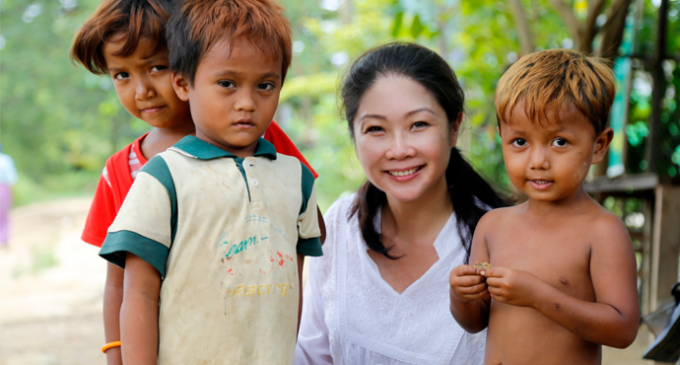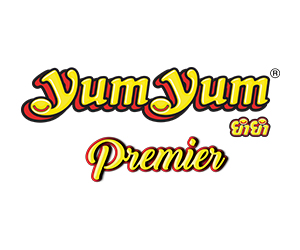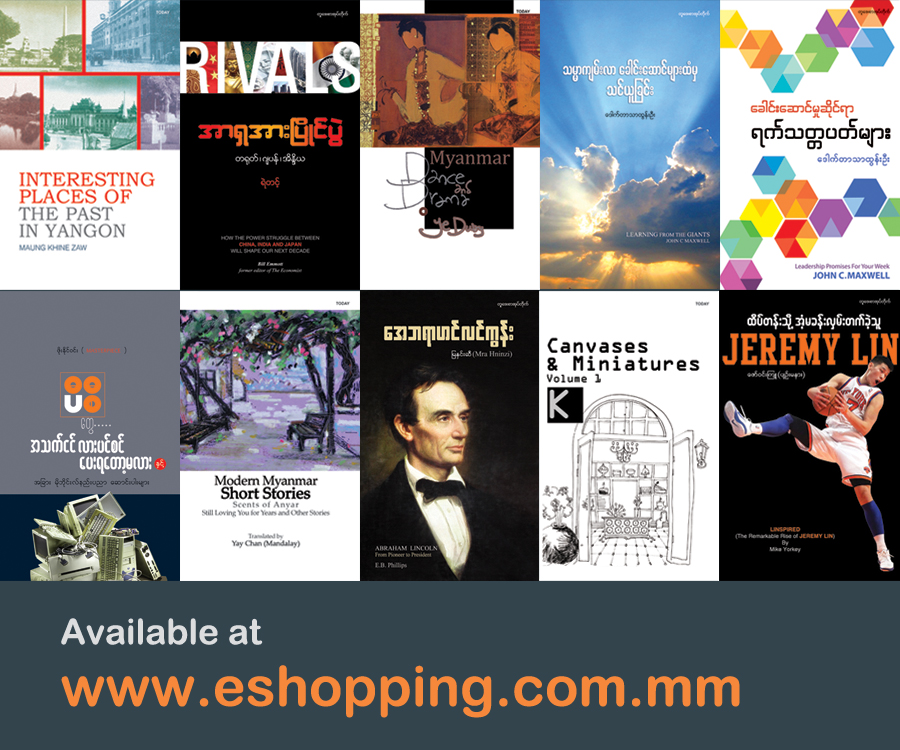Trinh Proctor : The Founder of Yangon Life Website

Mrs.Trinh Proctor, the Founder of Yangon Life (www.yangonlife.com.mm), is not only an entrepreneur but has also had a long and prestigious career in banking and consulting around the world. Trinh also takes the role of Managing Director in BAS Consulting Pte Ltd. TODAY met with Trinh to discuss her views on the entry of foreign banks, on Myanmar people in a changing environment and so on.
Your comment on Myanmar People in a changing environment …
Everyone talks about the physical changes taking place – more traffic, restaurants and construction. For me, the effect of these changes are having on Myanmar people is what we need to spend more time discussing.
Change is a constant worldwide, but it normally occurs over a period of time so people have time to adjust. But Myanmar’s opening to the international community happened almost overnight – similar in some ways to the fall of the Berlin Wall. I’m amazed at how calmly Myanmar people reacted – perhaps the practice of Buddhism plays a role in the people’s acceptance of change and their strength in dealing with these changes.
But now I’m seeing differences emerg-ing between segments of society. The poor don’t think about change – they are forced to live in the present and work out how to make it through each day. In contrast, the younger generation are eagerly grasping at the changes in their everyday lives, such as –change to more western dress, watch more foreign movies, enjoy access to internet and social media. Naturally, the older generation are more resis-tant to change – they’re happy their children have more opportunities, but it’s too late for them to change their own ways.
The really interesting group are the 30-38 year olds who are caught in the middle. Their education and work experience hasn’t prepared them for this new environment and they’re having to choose between two paths. One group takes the “that’s not how things are done in Myanmar” path. They continue to rely on the traditional way (“who do I know”) for getting through life, giving out favours and receiving favours in return. The second group takes the “the old ways are not enough anymore” path. They’re working hard to reinvent them-selves and learn new skills (“what do I need to know”).
And then there’s two other groups. Firstly the 30-40 year old “Repats”. Unlike their peers they already know the international way of doing things. Their challenge is how to find their feet in this swirling, changing Myanmar society? They don’t want to be viewed as foreigners, but in reality they are – because of their speech, habits and tastes and also they don’t have the strong local network to do things the traditional way!
Secondly, Myanmar businessmen/ entrepreneurs. They’re smart – they may not know what they need to change or how to change, but they know they must change some-thing because they see society is changing. But it’s far easier to change yourself than it is to change an entire business model or company culture that you’ve spent years building. I see many business leaders who have turned their company’s steering wheel, but are struggling to make their staff and businesses turn with them.
Given your international banking and consulting experience, what impact do you think the entry of foreign banks will have on local businesses?
The foreign bank licenses contain a number of restrictions. They’re limited to one Myanmar branch each, cannot provide retail banking services and can only lend in foreign currencies, unless they make a loan via a local bank – in fact they are allowed to do all the things they can already do via their offshore offices!
So I think the biggest immediate impact on local businesses will be on staffing. Foreign banks will be keen to recruit talented locals who have foreign language skills. The lucky chosen few will be unable to turn down the chance to experience offshore training, earn a higher salary and add an international company name to their CV. Local businesses will be hard pressed to retain their trusted staff.
On the positive side, the arrival of foreign banks should make it easier for large local businesses to access trade finance facilities and make international collections or remitt-ances. But I’m afraid this won’t apply to small and medium sized businesses as foreign banks will view them as too risky – they’ll focus on servicing large local companies and the local subsidiaries of their existing offshore customers.
Places you have been in Myanmar.
I’ve been to the usual tourist places – Naypyitaw, Bagan, Mandalay, Inle Lake and Ngwesaung, but the best decision we took was to do all this travelling by car. Flying is quick and easy, but you don’t get to see the country. Driving through Ayewarwady, Bago, Magway, Mandalay and Shan showed how different Yangon is to the rest of the country– and why the official name of the country starts with the word “Union”! Myanmar is huge, its country-side and people are very diverse. I loved watching the sunsets over the temples in Bagan as farmers walked their cattle home along the dusty roads; seeing the tomato fields and houses sitting over the lake at Inle was a unique experience; and lazing with the family on the beach at Ngwesaung was wonderful too! Mandalay_ I think tourists go with an overly romanticized image of what it will be like, but for business people it’s great because business is booming!
But it’s the less touristy things I remem-ber most. The farmers working to make a living from the baked earth in the central dry zone; the views as we drove up and across the Shan plateau, and best of all, being invited inside the homes of Myanmar people so we could exper-ience another way of living. No matter if the streets are flooded or the land bare and dry, Myanmar people live life with a smile on their face– I hope that’s something my son will take with him wherever he goes in life.
Which Myanmar Traditional food do you enjoy most?
Like all cuisines, a lot depends on the quality of the cooking – I really don’t enjoy Myanmar dishes where the chef has made them too salty or oily! But my top 5 favourite dishes would have to be:
1. Tea leaf salad – anytime during the day or night. The dish looks like an art work and has a very creative mix of ingredients that I would never have imagined would go together, yet the flavours, colours and different textures (from soft to very crunchy) blend perfectly, making a delicious dish.
2.Mohinga – I prefer it more for lunch than breakfast. I resisted tasting this for a long time because of the fishy smell, but once I’d tasted it, I had to go back for more. It’s full of flavour and the fun part is that it comes in lots of different tastes and varieties depending on which stall or restaurant you choose! I now eat this once a week.
3.Grilled eggplant salad – simple but I really enjoy fresh vegetables so this blend of natural flavours with a smokey, silky, natural sweetness is one I always order.
4. Myanmar prawn curry with rice – sweet large river prawns in the smooth curry sauce, not too wet and not too dry, sweet with a touch of salt, full flavours and spices that don’t overwhelm the taste buds. Yum!
5.Shan beef noodle soup – my comfort food. It reminds me of the Vietnamese noodle soup dish “Pho”.
Best Places for you to hang out in Yangon?
For a quiet business chat over a coffee I like Acacia, Fuji Coffee House. For a business or social dinners, I like ShweSaBwe, L’Opera, or The Strand Grill. For local food I love MinnLan (great seafood!) or House of Memories (we like the old colonial house). I also like to explore hidden places – for example Shoda on the lower block of Latha Street is where I enjoy lunch with my team, and is a favourite amongst students as the sushi and sashimi are great value!
Because I’m out so much during the week, at the weekend I spend more time with the family. I enjoy spending Sunday down at Pun Hlaing Country Club where my son is learning to swim. If not we get some exercise by walking or riding bike by Inya or Kandaw-gyilake; or head to the equestrian centre for horse riding (on those rare occasions when I have the time)! We like to keep the weekends informal so we might stop for a bite at Alamanda or Café Napoli in Golden Valley, or a coffee and cake at Yangon Bakehouse, or pizza at L’Opera, or Sharkey’s. Di nner is mostly about spending time with the family and or friends. I especially enjoy setting up the open BBQ outdoor where everyone can get involved in the cooking, even a 5 year old!
Photo Credit : Ca Lis To
./wp-content/uploads/2018/10/Emirate-Online-TDY.png)


















There are no comments at the moment, do you want to add one?
Write a comment